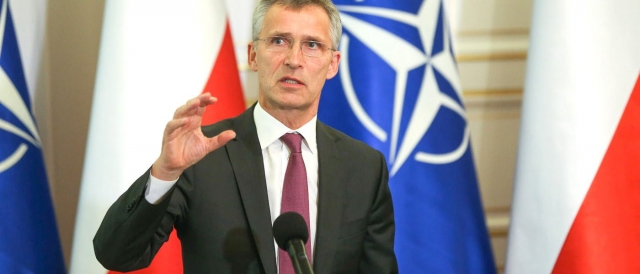NATO Secretary-General Says Alliance Open to Talks with Russia
WARSAW – NATO’s Secretary General Jens Stoltenberg said late Friday that the alliance is committed to maintaining a political dialogue with its old advisory Russia.
Speaking at a press conference following the opening day of NATO’s landmark summit in the Polish capital Warsaw, Stoltenberg said the Western alliance “had decided to maintain the NATO-Russia Council as a platform for political dialogue with Moscow. We, the Alliance, strongly believe that there is no contradiction between strong military deterrent and political dialogue.”
Russia and its aggressive stance towards Europe have dominated the discussions at the summit, as members on NATO’s eastern flank – most of which were once members of the Soviet-led Warsaw Pact – have become increasingly alarmed by Moscow’s invasion of Ukraine and continued support for pro-Russian separatists in Georgia and Moldova.
Boosting NATO’s defensive capabilities in the Baltics and Poland is one of the keys issues being discussed in Warsaw. A decision will likely be made on Saturday as to whether to deploy four NATO battalions to Estonia, Latvia, Lithuania and Poland, Stoltenberg said.
NATO’s Rapid Response Force has tripled in size since Russia launched an invasion of Ukraine’s Crimea Peninsula and later helped wage a brutal war with local pro-Russian separatists in the country’s east.
Moscow’s actions stunned the West and exposed NATO’s weaknesses along its eastern borders. The US’ top general in Europe, Ben Hodges, said in the weeks leading up to the summit that NATO would currently be incapable of halting a Russian invasion of Eastern Europe
NATO’s key members – particularly the US, UK, Canada and Germany – have attempted to reassure Europeans that the alliance remains committed to guaranteeing the continent’s security.
US President Barack Obama, who is attending the summit, announced Friday the deployment of 1,000 additional US troops to Poland in a move he called a message to Eastern Europe that shows Washington will not compromise on Europe's security.
Obama’s announcement was followed by a statement from UK Defence Secretary Michael Fallon, who confirmed early Saturday that additional British troops would be sent to Eastern Europe to help bolster NATO’s defensive capabilities, part of a broader scheme to “deter Russia from any further aggression towards its neighbors”.
A battalion of 500 soldiers will be sent to Estonia while 150-200 troops will be based in Poland. Britain will take command of NATO’s strike force early next year, Fallon confirmed
NATO officials have worried that Britain's recent vote to leave the EU would further embolden Russia, as it would interpret the UK’s decision as a sign that the West’s strategic cohesion was slowly beginning crumble.
The alliance has also deployed a new Ballistic Missile Defense system designed to protect Europe against external threats.
Moscow considers the system a ‘major provocation that wrecks the strategic balance in Europe’, and has vowed to counter the deployment of defensive missile batteries in Poland and Romania with its stationing of Iskander short-range ballistic missiles in Russia’s Baltic coast exclave of Kaliningrad.
The Kremlin responded sharply to NATO’s decision to deploy more troops in a defensive capacity to Eastern European.
“It is absurd to talk about a threat from Russia when in the middle of Europe dozens of people are dying every day, Americans are killing each other and in the Middle East, hundreds of people die every day. NATO has to be an absolutely short-sighted organization to distort what is important,” Putin’s spokesman, Dmitry Peskov told Russia’s state-run news agency TASS in an interview early Saturday.
Peskov also said Moscow would continue to build-up its air, ground and strategic rocket forces along its western and southern borders if NATO continued to consider Russia a hostile threat. He added that cooperation between the alliance and Russia would be impossible until NATO’s policy towards Russia changes course.
By Nicholas Waller












